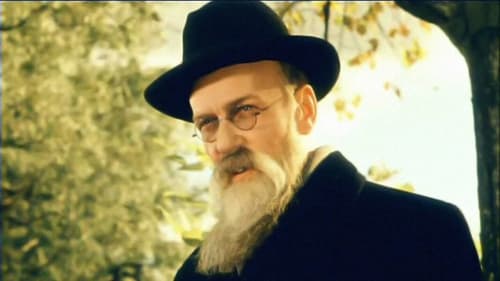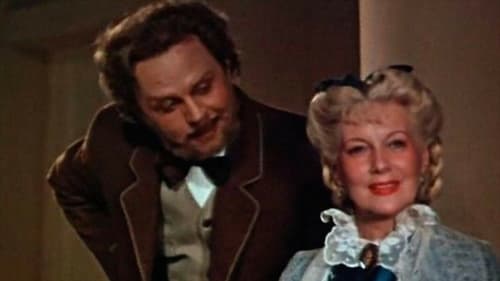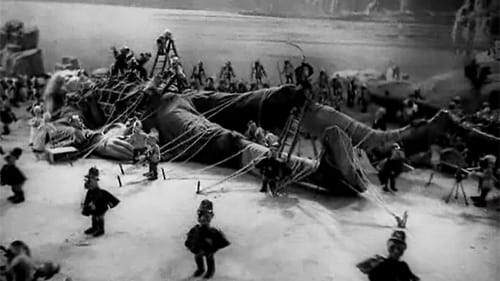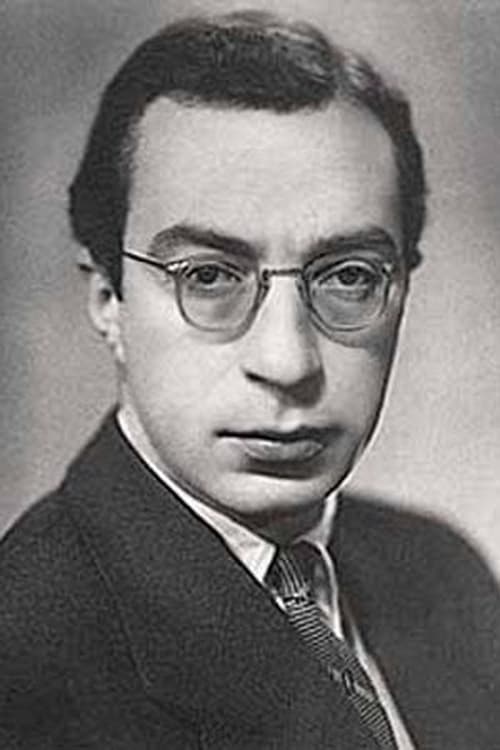Grigoriy Roshal
Nacimiento : 1899-08-21, Novozybkov, Chernigov Governorate, Russian Empire [now Bryansk Oblast, Russia]
Muerte : 1983-01-11
Historia
Soviet director and screenwriter. Brother of screenwriter Serafima Roshal. Married to screenwriter Vera Stroyeva.

himself
A documentary on the life of the famous actress, deceased wife of the director Grigoriy Aleksandrov.

Writer

Director

Director

Screenplay
Germany, the 1930s. A young scientist, Professor Johannes Werner discovers rays of life-giving power. The scientist refuses to give up his invention for military use and, breaking the equipment, runs to the USA, where he hides for a long time under the name of Martini. One day, after being invited to a military industrial concern to see a new European invention, Werner meets his former pupil Huber. Huber, a traitor and fascist, has restored the professor's apparatus according to stolen plans and is demonstrating it as his own invention. Werner rejects the proposal for joint cooperation and, at a meeting in the hall of scientific associations, reveals his real name and resolutely reveals the criminal intentions of the revanchists.

Director
Germany, the 1930s. A young scientist, Professor Johannes Werner discovers rays of life-giving power. The scientist refuses to give up his invention for military use and, breaking the equipment, runs to the USA, where he hides for a long time under the name of Martini. One day, after being invited to a military industrial concern to see a new European invention, Werner meets his former pupil Huber. Huber, a traitor and fascist, has restored the professor's apparatus according to stolen plans and is demonstrating it as his own invention. Werner rejects the proposal for joint cooperation and, at a meeting in the hall of scientific associations, reveals his real name and resolutely reveals the criminal intentions of the revanchists.

Director
The third film in the trilogy ("The Sisters", "The Eighteenth Year", "The Gloomy Morning") based on the novel by Aleksei Tolstoy "The Road to Calvary". About the fate of the Russian intelligentsia against the background of the collapse of the Russian Empire and the civil war, which turned the lives of all the heroes of the film narration. Defending Tsaritsyn, the red commander Telegin was seriously wounded. At the hospital, he meets Dasha. After his recovery, the young spouses go together to the Red Army.

Director
Swept up in political unrest during World War I, two sisters in St. Petersburg cope with turbulent romances as Russian history is made around them.

Director
Swept up in political unrest during World War I, two sisters in St. Petersburg cope with turbulent romances as Russian history is made around them.

Writer
Drama of the life of a peasant family, who came to work in the fisheries of Astrakhan. The film is set in the late XIX - early XX centuries.

Director
Drama of the life of a peasant family, who came to work in the fisheries of Astrakhan. The film is set in the late XIX - early XX centuries.

Writer
San Petersburgo, a finales del siglo XIX. El compositor Nikolai Rimsky Korsakov está en el momento álgido de su creatividad. Su nueva ópera "Sadko" ha sido rechazada por el Teatro Imperial, pero es representada en un teatro privado propiedad del promotor de arte Savva Mamontov, donde recibe una cálida acogida por parte del público. La ópera "Sadko" de Rimsky Korsakov fue seguida por otras obras maestras como "Mozart y Salieri", "El cuento del zar Saltan" y "El vuelo del Moscardón".

Director
San Petersburgo, a finales del siglo XIX. El compositor Nikolai Rimsky Korsakov está en el momento álgido de su creatividad. Su nueva ópera "Sadko" ha sido rechazada por el Teatro Imperial, pero es representada en un teatro privado propiedad del promotor de arte Savva Mamontov, donde recibe una cálida acogida por parte del público. La ópera "Sadko" de Rimsky Korsakov fue seguida por otras obras maestras como "Mozart y Salieri", "El cuento del zar Saltan" y "El vuelo del Moscardón".

Writer
The history of the gypsy Aleko who couldn't forgive the betrayal of his wife.

Director
The history of the gypsy Aleko who couldn't forgive the betrayal of his wife.

Writer
Durante la época en que Mussorgsky vivió en el pueblo, observó cosas que le dejaron una fuerte marca en su alma y que le influiría en su estilo artístico. Su asociación con 'El Grupo de los Cinco', los discursos apasionados del crítico musical Vladimir Stasov, los encuentros con la artista Ilya Repin y su obra 'Boris Godunov', son episodios que revelan el talento excepcional y la fuerte personalidad del compositor ruso.

Director
Durante la época en que Mussorgsky vivió en el pueblo, observó cosas que le dejaron una fuerte marca en su alma y que le influiría en su estilo artístico. Su asociación con 'El Grupo de los Cinco', los discursos apasionados del crítico musical Vladimir Stasov, los encuentros con la artista Ilya Repin y su obra 'Boris Godunov', son episodios que revelan el talento excepcional y la fuerte personalidad del compositor ruso.

Director
Russia, 1875: In Riazan’, Dr Pavlov is summoned to a landowner who refuses to accept the inevitability of his death; to Pavlov’s dismay, he orders the destruction of a beautiful apple orchard. 1894: Experimenting on dogs, Pavlov tries to comprehend the interaction between nerves and external signals governing digestion. In 1904, he formulates the principles of conditional reflexes. When Zvantsev, an opponent of Pavlov’s materialist worldview, leaves the laboratory, the scientist hires Varvara Ivanova who becomes his most reliable assistant. 1912: Pavlov receives an honorary doctorate from Cambridge University. 1917: Despite Pavlov’s political scepticism, the Bolshevik administration treats him with great respect.

Writer
The screen adaptation of the novel "Abai" by Mukhtar Auezov recreates the story of prominent Kazakh poet and philosopher Abay Kunanbayev. The famous Kazakh poet became friends with the Russian exile, scientist Nifont Dolgopolov. Under the influence of their growing friendship, Abai formed some of his academic ideas and principles.

Director
The screen adaptation of the novel "Abai" by Mukhtar Auezov recreates the story of prominent Kazakh poet and philosopher Abay Kunanbayev. The famous Kazakh poet became friends with the Russian exile, scientist Nifont Dolgopolov. Under the influence of their growing friendship, Abai formed some of his academic ideas and principles.

Director
Fabrikant, Ilya Artamonov of the former serfs. His desire to strengthen and develop the business knows no obstacles. He is still associated with the peasants and craftsmen, but with his death, this relationship ends. Between Peter Artamonov, his son, who became the owner of the factory, and the workers grows a wall of enmity. The first political speeches are brewing. On the side of the proletariat becomes the heir artemovskogo case Ilya Artamonov, Jr.

Director

Director
Directed by Grigori Roshal.

Writer
"Paris Commune," 1870-1871. Poor working class in Paris rises up against their oppressors as France is defeated by Germany in the 1870-71 Franco-Prussian war.

Director
"Paris Commune," 1870-1871. Poor working class in Paris rises up against their oppressors as France is defeated by Germany in the 1870-71 Franco-Prussian war.

Writer
The story, a Communist re-telling of Gulliver's Travels, is about a young boy who dreams of himself as a version of Gulliver who has landed in Lilliput suffering under capitalist inequality and exploitation.

Director
A loose Communist adaptation of a Dostoyevsky novel.

Director

Director
A Socialist Realist distortion of Dr. Paul Kammerer's experiments in the inheritance of acquired character(istic)s -- the (not entirely anti-Darwinian) conjecture that certain changes the environment produces in an individual may spontaneously appear in the next generation. As recounted in Arthur Koestler's The Case of the Midwife Toad (1971), Kammerer (1880-1926) claimed that darkened footpads he had artificially induced in a toad had been passed on to its offspring. When it was discovered that his critical specimen had been injected with ink (though why and by whom is still unknown), his credibility was destroyed and he apparently suicided. Richard Goldschmidt's synopsis of the film in "Research and Politics," Nature (1949), mocks it as Soviet propaganda in support of the inheritance of acquired characters: The importance attached to the subject is revealed by the facts that none other than the then all-powerful [People's] Commissar for [Public] Education, the highly ...

Director
This 1928 film features stylized cinematography and actors from the Moscow Art Theater in a fiction story based on the life of Jewish Labor Bund member Hirsch Lekert who attempted to assassinate the Vilna governor in 1902 to avenge the flogging of workers who participated in a May Day rally.

Director
A comedy starring Nina Shaternikova, The Skotinins is loosely based on the 18th century play The Minor by Denis Fonvizin. In it, the upper class is shown as both depraved and stupid, engaging a variety of absurd, over-the-top follies.










